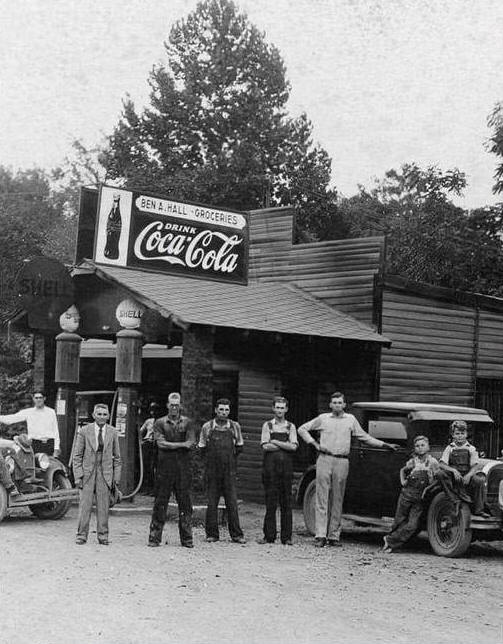Ben Hall Groceries: A Staple in Greenback, Tennessee During the 1920s

In the rolling hills of East Tennessee, nestled in the small community of Greenback, Ben Hall Groceries stood as a central pillar of local life during the 1920s. At a time when small towns were tightly knit, the store not only provided essential goods but also served as a gathering place for locals to exchange news, share stories, and build a sense of community. Greenback, like many rural Southern towns in that era, was characterized by its agricultural roots and close-knit families. Ben Hall's store became a vital part of the townís rhythm.
The Store's Origins and Role
Ben Hall, a well-respected and industrious local businessman, established his grocery store with the intent of providing his neighbors with an easy, convenient way to access food staples and household necessities. In an era before chain supermarkets and when travel was limited, small grocery stores like Hallís were essential for supplying the surrounding farms and rural homesteads. The store stocked basic provisions such as flour, sugar, canned goods, and fresh produce from local farms. Seasonal items were a highlight, as the town relied heavily on what the land provided.
Hall's store wasnít just a commercial venture; it was a social hub. It was the spot where men gathered after a day in the fields to catch up on local gossip, politics, and news from the outside world. As cars were rare and news traveled slowly, Hall's grocery served as the place where rural Greenback could stay connected.
Community Impact
The importance of Hallís store extended beyond mere commerce. The 1920s were a time of great change in America, as industrialization began reaching even rural areas. However, in Greenback, life remained rooted in traditional, agrarian values. Ben Hallís store became an anchor for the town, symbolizing stability and continuity during a time of growing urbanization elsewhere. The store was a place where credit was often extended to families in need, and many could rely on Hallís generosity in times of hardship.
Additionally, the store was a bridge between the agricultural community and the broader market. Farmers would often sell or trade their produce at the store, with Hall acting as a mediator who facilitated the exchange of goods. This symbiotic relationship helped local farmers find buyers for their surplus and ensured that the store remained stocked with fresh, locally sourced items.
Hall's Store During the Great Depression
As the Great Depression loomed toward the end of the 1920s, small-town stores like Ben Hallís were profoundly affected. While some businesses were forced to close, Hall's store managed to survive by adapting to the tough economic climate. Many local families faced hardship during this time, and Hall became known for extending credit and offering support to his neighbors. His store helped many Greenback residents weather the economic storm, reinforcing its status as a beloved institution in the town.
Conclusion
Though decades have passed since Ben Hallís Grocery stood in Greenback, its legacy remains part of the townís rich history. The store was more than just a place to buy groceriesóit was a cornerstone of the community, where relationships were forged, and neighbors supported one another. In the 1920s, Ben Hallís Grocery encapsulated the spirit of small-town America, providing not just sustenance, but a sense of belonging in a rapidly changing world.